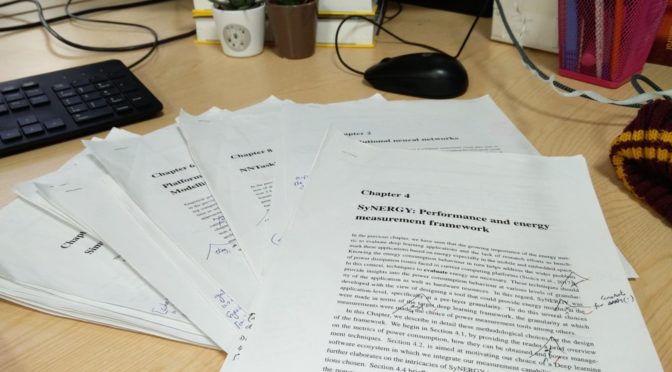A new beginning and the end of my PhD journey – Dr Crefeda Rodrigues
Research and impact Student experience Uncategorized 15th January 2020
The year 2020 is here where we find ourselves with a reinvigorated sense of hope and expectations for the year ahead of us. I have a similar feeling as well not only because it is a new year but also because I successfully completed the last step of my PhD journey last month, that is, the PhD Viva. This last step, which is also known in some places as a “Thesis Defence” is a crucial moment where depending on the outcome, years of your hard work and patience will finally morph into something tangible: a doctoral degree but also a proud moment to add the title Dr. to your name. Therefore, I devote this final blog toward the last two steps of the PhD: the thesis write up and the PhD Viva.
Thesis Write Up
In a previous blog (find my full archive here), I have spoken about the writing process and what to expect when writing for a conference paper or journal. The process of writing up a paper can be considered as a glimpse of what the writing process for a thesis looks like. For example, a key difference is the length of the material and the key message you can put across. A conference paper is a limited resource, often in the range of 8 to 12 pages, in which you can summarize the main steps of your methodology, consolidate interesting results and articulate key takeaways from your paper that are relevant to the research community. On the other hand, a thesis gives you the opportunity to go in greater depth in terms of methodology details, reasons for choosing them and a more thorough analysis of the results. When writing up for a thesis, you will find that sections of a paper could translate to entire chapters in the thesis with their own sections!
I submitted my thesis in September of last year which meant that I began writing at least 6 months prior. While I found that a lot of the material I had used for my conference and journal papers were useful for the thesis, I did have to spend time at the beginning of the 6 months formulating a structure for the thesis. By this I mean, creating a first draft of the content table for the thesis. Over the course of writing up, this structure will get modified but it is a good start for getting an outline for the flow of ideas and the story. It is also a good idea to get some publications before you write up but even if you do not have any in your repository, having a good structure and plan will help you write better. Most people also leave writing up for papers for after submission of the PhD. The repository that gives you an Latex repository to help you start writing up for the thesis can be found here.
For those writing up, two months in advance your submission deadline there will be an email circulated notifying you to submit your “Notice of Submission ”. This is an administrative step that you have to perform stating your intention to submit the thesis and the date by which you will submit it. After completing this step, a link to submit the electronic version of the thesis becomes activated on My Manchester. To help students with this process there is also a valuable workshop called “Managing eThesis submissions workshop” that gives information regarding this process. Finally, make sure you are prepared to write and rewrite several versions of a chapter, a section, a paragraph, a sentence, a section heading or even a word!

Several revisions of different Chapters!
The thesis submission process is relatively simple, it consists of uploading an electronic version of your thesis to a link in My Manchester, printing two copies of the thesis for each examiner, binding the thesis (which can be done for 8£ each at MUprint and submitting the physical copies to the Faculty Graduate Office in Sackville building.
Once the thesis is submitted, you feel a bit lighter in two ways: physically, because you are no longer carrying two copies of your thesis running around Manchester to complete the submission process and mentally, because you are no longer thinking about the 30,000+ words that you have just written.
The Viva
The next step is the Viva which is a daunting experience to defend your thesis in front of a panel of examiners. Typically, these examiners are chosen by the supervisor with consultation from the student. The panel of examiners consists of an internal examiner from your university and an external examiner that could be from any university in the world. The external examiner or as we like to shorten it to “The external” could be someone with overlapping research interests in your field. On a side note, I swear that every time someone was asked me who my “External” is; it gave me a sense of impending doom for some reason. Anyway, to prepare for the Viva in the month of September, a workshop called “Viva Survivor” gave some insight of what to expect during a viva and tips on how to prepare you for the actual day! From this workshop, I found the viva question card quite useful when formulating my list of possible questions. Make sure to read the thesis prior to viva to awaken those dormant brain cells!
Finally, the examiners decide on a date for holding the actual viva. For my viva, I was notified a week in advance and I was told to prepare a 20 minute brief talk about my PhD in the afternoon which was to be followed by a discussion. It is normal to see colleagues around you in a similar stage of their PhD, being given different formats for the viva. For example, some may be given a 10 minute talk in the morning or afternoon with a discussion round while others may not even have to give a talk! The expected duration for a viva is supposed to be at least 3 hours long. Some can last longer. Although when you actually give it, it feels like an eternity.
On the viva day, after an anxious night of sleep, I had everything prepared:
- Read the thesis: check,
- Slides: check,
- Talk: check,
- List of possible questions: check,
- Comfortable clothing: check,
- A bottle of water to keep me hydrated: check,
- People constantly asking me if I am prepared and reassuring me it will be over soon: check,
- Sanity: …
My viva lasted 3 hours, where the 20 minute talk was more of a warm up to the actual viva process. The examiners went chapter by chapter and page by page with questions that spanned from relatively simple questions that tested the boundaries of my knowledge in a particular topic, clarifications of any diagrams, equations or terminology used to harder questions involving assumptions made in the methodology, when those assumptions would break and limitations of the methodology presented in my work. Overall, the examiners asked me questions to test how well I would stick to results and analysis I presented in the thesis, my understanding of related work, how well I could compare my work to others in the field and the limitations and scope of work presented. Certain questions that I found particularly challenging to answer were the ones related to experiments that we (by “we” I mean me and my supervisor) considered would be out of the scope of the current PhD but could open up other interesting lines of research. These are questions that are related to the future work. For example, I was asked the following question: If you had more time to do X, how would you do it and what outcome would you expect? Would it challenge the results presented in the thesis?
The Actual Final Step: Corrections
I did say the final step was the viva but in fact that would be slightly misleading. A viva is typically followed by a result which could be: A1: Passed with no corrections, A2: passed with minor corrections, B1: passed with major corrections etc. A list of possible viva outcomes is given in the PGR handbook or this link. Once you know your result it is time to pop open a bottle of champagne to celebrate with friends or head to the pub for a drink at a local bar.
Depending on the outcome, the last step involves updating the thesis with corrections specified and submitting a final copy of the thesis after approval from the examiners! After this you can officially, add the title “Dr.” to anywhere you please.
On that final note, it is time for me to bid farewell and conclude this series of blogs. I hope that the readers will be inspired to consider doing a PhD or continue to be motivated while doing it. I would like to thank Jez for giving me this opportunity to write these blogs for the Department of Computer Science for the past four years or so, my good friends for proof reading some of them and finally, to readers and my family members that left positive comments in the comment section! I am also looking forward to the next phase of my career where I work as a Research Associate at The University of Manchester and my Graduation Ceremony this year.
Cheers,
Dr. Crefeda Faviola Rodrigues






Leave a Reply